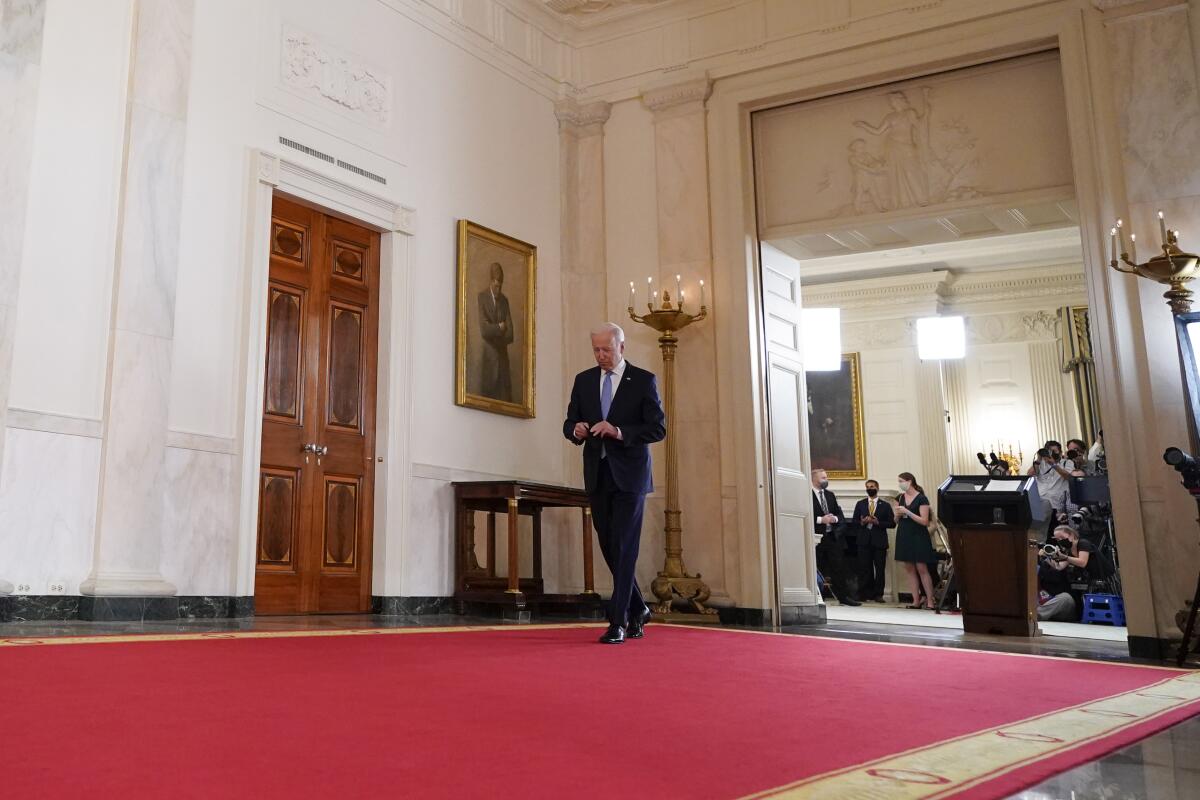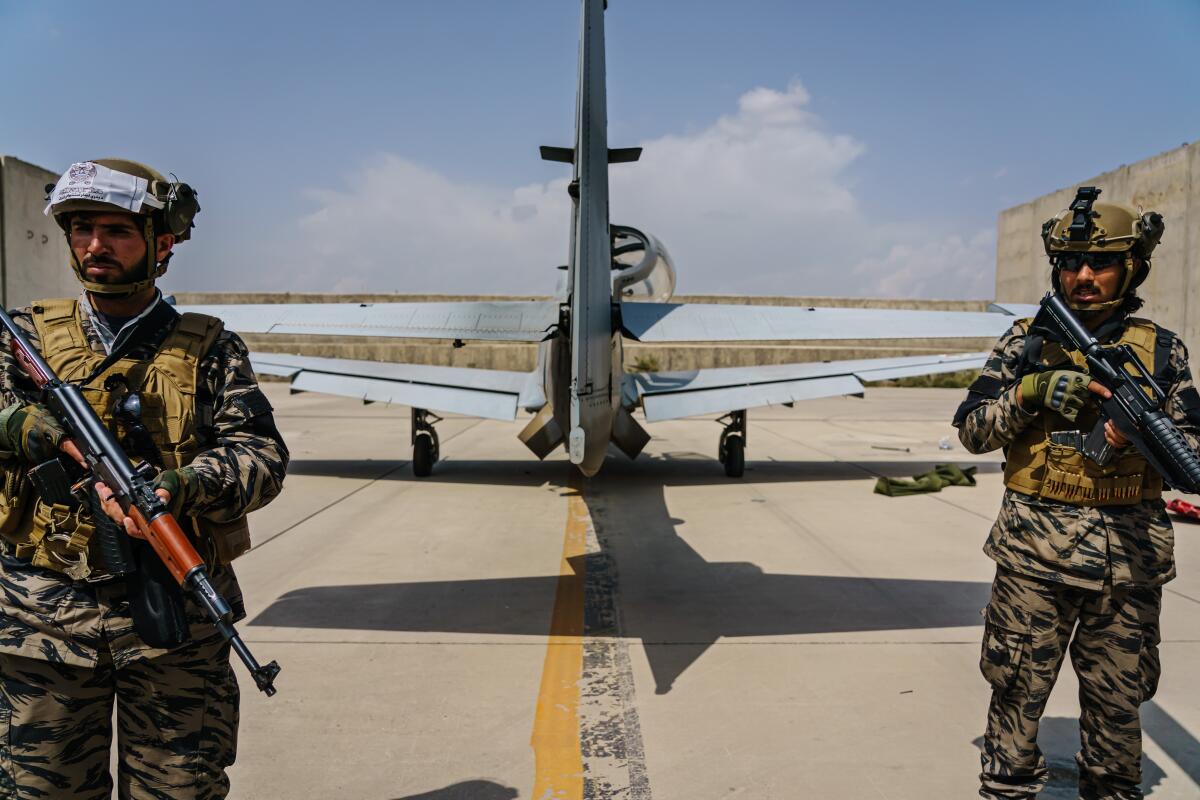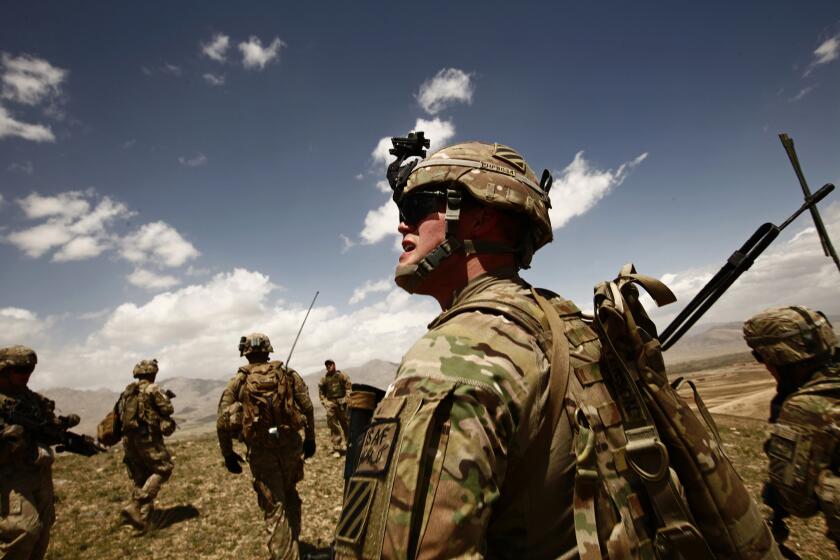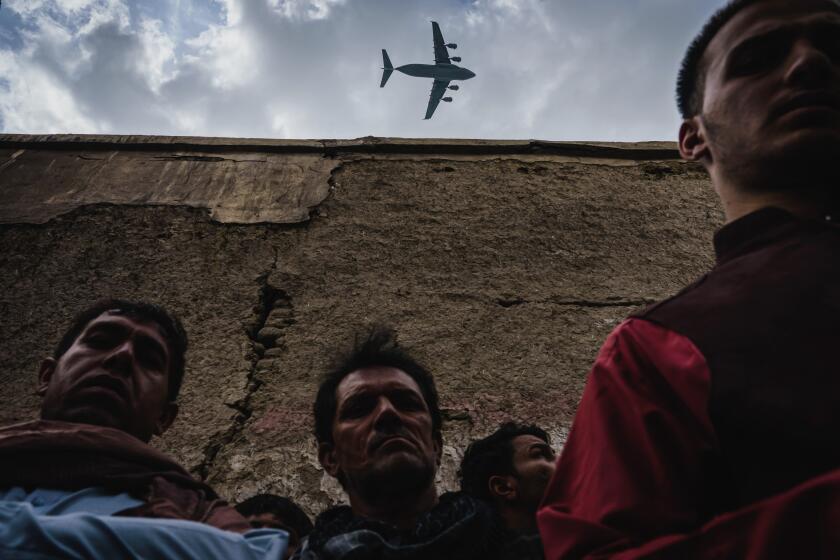Biden says Afghanistan war ‘should have ended long ago’ as he defends withdrawal

- Share via
WASHINGTON — President Biden on Tuesday defended his decision to withdraw U.S. troops from Afghanistan, describing the frantic evacuation as an “extraordinary success” even though dozens of Americans and thousands of Afghan allies were left behind.
Biden’s remarks were passionate and defiant, reflecting his determination that ending America’s longest war was the right choice despite a wave of criticism that the departure was mishandled.
“With all of my heart, I believe this is the right decision, a wise decision, the best decision for America,” he said from the White House.
The war, he asserted, “should have ended long ago.”
U.S. troops fought in Afghanistan longer than in any other war. Here’s a look at major events over the last two decades.
Although Biden originally promised the withdrawal would be “orderly and safe,” he said Tuesday that some level of chaos was unavoidable.
“The bottom line is there is no evacuation from the end of a war that you can run without the kinds of complexities, challenges and threats we faced,” he said. “None.”
The last U.S. troops left after nightfall the previous evening, ending two decades of war that began as retaliation for the Sept. 11, 2001, terrorist attacks by Al Qaeda, the militant network based in Afghanistan.
The Taliban, the fundamentalist group that U.S. forces drove from power only to see it regain control of the country in recent weeks, celebrated the American withdrawal by firing weapons in the air and scavenging for abandoned equipment at Kabul’s airport.
The departure of U.S. troops marked the final stage of an evacuation that flew more than 120,000 people, mostly Afghan allies, out of the country.
Biden said his administration worked tirelessly to help Americans leave Afghanistan, adding that diplomatic efforts would continue now that military operations have ended.
Secretary of State Antony J. Blinken said Monday that U.S. diplomats would pressure the Taliban to ensure safe passage.
“Our commitment to them and to all Americans in Afghanistan and everywhere in the world continues,” he said.
Blinken said many of the remaining Americans were dual citizens with “deep roots and extended families” in Afghanistan, and they’re facing a “painful choice” about whether to leave.
Thousands of diplomats, foreign service officers and civil servants here and overseas have been dedicated to the evacuation effort in recent weeks, according to State Department officials.
Hunched over rows of computers in hidden rooms at department headquarters, a core staff has placed tens of thousands of phone calls and sent tens of thousands of emails to contact U.S. citizens and Afghan allies.
At one point, they were coordinating 90 charter flights per day out of Kabul. Most went to places like Qatar — known as “lily pads” in the parlance of the evacuation effort — before continuing to final destinations such as U.S. military bases.
The flights are paused now, and it’s unclear when Kabul’s airport will be operational again now that it’s under Taliban control.
The last U.S. forces flew out of Kabul’s airport in Afghanistan, the Pentagon said Monday, bringing down the curtain on America’s longest war.
Former President Trump made the original decision to pull out of Afghanistan, reaching a deal with the Taliban for U.S. forces to leave May 1.
After Biden took office, he pushed back the deadline to the end of the summer, but he remained committed to ending America’s longest war. He was the fourth president to oversee the conflict, and he said he refused to pass the burden to a fifth.
“I made a commitment to the American people that I would end this war. Today, I’ve honored that commitment,” he said. “It was time to be honest with the American people again. We no longer had a clear purpose in an open-ended mission in Afghanistan.”
The withdrawal came at a heavy cost. Thirteen U.S. service members safeguarding the evacuation died in a terrorist attack by a local affiliate of the militant group Islamic State. A U.S. drone strike intended to prevent another bombing may have killed several children.
The president’s political standing has also been bruised by bipartisan concerns that the withdrawal was mismanaged. A new Pew Research Center survey said 54% of Americans believe it was the right decision to withdraw troops from Afghanistan, but 42% said the Biden administration has handled it poorly. Only 27% said the administration has done a good or excellent job.
Biden won office by promising competence and empathy in the White House, but his handling of the withdrawal has more often been characterized by stubbornness. Some military families who lost relatives in the operation have been raw with anger at the president, even after meeting with him at Dover Air Force Base on Sunday.

Administration officials also failed to anticipate how swiftly the Taliban would retake power once it became clear that the U.S. military was leaving. As the deadline for withdrawal approached, the Taliban advanced swiftly, sweeping into Kabul two weeks ago.
Biden conceded Tuesday that assumptions about how long the Afghan security forces would hold off the Taliban “turned out not to be accurate.” He blamed “corruption and malfeasance” in the Afghan government that U.S. forces had spent years propping up.
The Taliban’s arrival in the country’s capital forced the U.S. to organize a massive airlift to evacuate American civilians and Afghan allies.
Now that the withdrawal is over, Afghanistan has been left in the hands of the same fundamentalist group that sheltered Al Qaeda before the Sept. 11 attacks and spent years methodically fighting to reassert control over the country.
It remains to be seen how long the political fallout lasts. The American attitude toward Afghanistan had long been dominated by apathy, which allowed the war to drag on with no end in sight. But the evacuation has refocused voters’ attention on Afghanistan, at least for the time being.
Biden said “the world is changing,” and it was important to shift toward addressing other foreign policy concerns.
“There’s nothing China and Russia would rather have, would want more, in this competition, than the United States to be bogged down another decade in Afghanistan,” he said.
Times staff writer Tracy Wilkinson contributed to this report.
More to Read
Get the L.A. Times Politics newsletter
Deeply reported insights into legislation, politics and policy from Sacramento, Washington and beyond. In your inbox twice per week.
You may occasionally receive promotional content from the Los Angeles Times.












